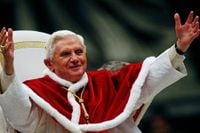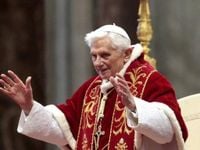On April 19, 2025, the Catholic Church marks a significant milestone: the twentieth anniversary of the election of Pope Benedict XVI. This anniversary serves as a moment of reflection on the pontificate of Joseph Ratzinger, who surprised many by becoming the first pope in centuries to resign from the papacy. While his resignation has often overshadowed his contributions, it is essential to recognize the profound impact he had on the Church during his tenure.
Benedict XVI's election was not just a mere transition in leadership; it was a pivotal moment in the Church's history. Ratzinger, a German theologian, was known for his deep intellectual rigor and unwavering faith in Christ. His journey to the papacy began with his appointment as bishop and later cardinal, roles he accepted with humility and a sense of obedience to the Church's needs.
Pope John Paul II, recognizing Ratzinger's theological prowess, repeatedly urged him to take on the leadership of the Congregation for the Doctrine of the Faith (CDF). Despite his reluctance, Ratzinger eventually acquiesced, demonstrating his characteristic humility. He understood that his role was critical during a time of theological turmoil within the Church, where core doctrines were being challenged.
During his time as head of the CDF, Ratzinger faced fierce criticism. Many portrayed him as a suppressor of theological freedom, but this characterization fails to capture the complexities of his leadership. As Larry Chapp notes in his reflections, "it is historically inaccurate to describe his mandate at the CDF as marked by inquisitorial repression." In reality, the theological discourse of the time was vibrant, with Ratzinger advocating for a balance between fidelity to Church teachings and open dialogue.
His tenure saw significant initiatives, including the establishment of ordinariates for former Anglicans and efforts toward liturgical renewal through the motu proprio Summorum Pontificum. These actions reflected his desire to bridge gaps within the Church and foster a sense of unity among diverse Catholic communities.
Benedict XVI's written works also left a lasting legacy. He authored beautiful encyclicals on faith, hope, and charity, and his reflections on the apostles and the life of Christ in the Jesus of Nazareth series are considered masterpieces of theological literature. These contributions highlight his commitment to deepening the understanding of Christian doctrine and the importance of personal faith.
Interestingly, Ratzinger never aspired to become pope. Following the death of John Paul II, he likely envisioned a quiet retirement in Bavaria, surrounded by books and the simple pleasures of life. However, the Holy Spirit had different plans, and he accepted the papacy with the same humility that characterized his entire life.
His resignation in 2013, a decision that shocked many, was ultimately an act of profound humility. Benedict XVI recognized that the Church might be better served by a younger, more vigorous leader. As he himself stated, his choice was not a retreat from challenges but a recognition of the need for a different kind of leadership in a changing world.
As the Church reflects on the legacy of Benedict XVI, it is crucial to remember that his life was marked by a deep sense of obedience to God and the Church. His commitment to truth and his willingness to bear the weight of leadership in tumultuous times are testaments to his character. Benedict XVI's contributions to the Church extend far beyond his resignation; they encompass a rich legacy of theological thought, pastoral care, and a deep love for Christ.
As we commemorate this anniversary, let us strive to understand and appreciate the complexities of his papacy and the depth of his faith. In doing so, we honor not only his memory but also the enduring values he championed throughout his life.





